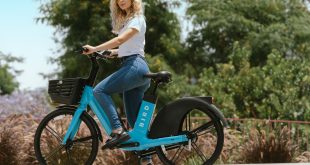As sales of e-bikes and e-scooters continue to soar, manufacturers need to reassure consumers that their products are safe. Rebecca Bland explores the fire safety question in the micromobility market
This piece first appeared in the November edition of BikeBiz magazine – get your free subscription here
Lithium-ion batteries have been present in our devices and technologies for years, but with the growth of electric bikes and scooters, a magnifying glass has been placed over their safety, particularly as a potential fire hazard.
From a statistical perspective, it is very unlikely that a reputable battery or charger will catch fire or overheat, but, with recent media exposure over the rare cases, both retailers and consumers need to have confidence in their electrical transportation, so I spoke to brands and industry experts about battery safety in e-bikes and e-scooters.
As it stands, the EN15194 certification is mandatory in many countries and, according to the European Committee for Standardisation, “is intended to cover all common significant hazards, hazardous situations and events of electrically power-assisted bicycles, when used as intended and under condition of misuse that are reasonably foreseeable by the manufacturer”.
There are also further certifications that manufacturers can attain, specifically relating to the electrical and fire safety of e-bikes, and this is something that rental e-bike company Zoomo offers as an option for consumers, as Lisa Conibear, Global commercial director of Zoomo explained.
“To offer greater protection and safety for added peace of mind, Zoomo e-bikes can also be delivered with optional UL2271 and UL2849 certifications. These UL certifications bring stricter compliance to the safety of batteries and electrical systems in e-bikes.”
The commercial market
Zoomo e-bikes are available to rent or buy, and it found that a large portion of their consumer base is couriers, who typically ride for longer periods throughout the day. So how does Zoomo ensure its batteries are up to scratch for high riding loads?
“Zoomo also makes certain that its manufacturers use a semi-automated or automated manufacturing process to ensure manufacturing quality, and that that manufacturer is ISO 9001 certified. We ensure that the battery and charger comply with all relevant safety standards, e.g. UL2271, ISO 13849-1 and 13849-2, 60950-1, as well as ensuring it supports fleet analytics e.g. data transmission via IoT to Zoomo backend.
“Additionally, the battery must be designed for commercial use-case and environmental conditions (high temp – low temp, vibration, UV exposure). This is especially important when Zoomo’s core customer base of delivery riders are often spending full days on their bikes, and need a battery that not only guarantees they can stay on the road longer and earn more but importantly, do it on a safe vehicle.”
It’s safe to assume that reputable brands and retailers have done their homework when it comes to battery safety, choosing the best tier of cells they can for the application, and with stringent testing available for peace of mind, consumers can make more informed decisions.
The trouble largely lies, unfortunately, with less regulated batteries and chargers making their way into the market, propositioned as ‘cheap’ alternatives to OEM products. When these less regulated products go wrong, it can lead to negative press and thus unfavourable connotations around batteries. So how can the industry overcome these negative perceptions?
Buy direct
“Lithium-ion batteries are in most people’s pockets (phones), bags (laptops and tablets) and homes (vacuum cleaners, electric cars),” added Sam Bernard, chief technology officer of e-scooter brand Pure Electric. “Technology has overcome this hurdle and been accepted into everyday life. Unfortunately, a small number of sub-standard imports and in some cases fake products, have given smaller e-vehicles, such as e-scooters, a poor reputation.
“Pure Electric believes that as high-quality e-scooters are accepted as an everyday form of transport, the quality of batteries used will naturally continue to improve. Our advice to customers is that they should only purchase lithium-ion products directly from the brand or supplier, with a good reputation and expertise.”
Educating consumers and lobbying governments to look at more stringent regulations is just one of the ways Zoomo recommends tackling the issue, which also includes people modifying their bikes and scooters by de-restricting their speed limiters.
“Illegal e-bikes, for example, that do not adhere to necessary battery certifications are one of the primary causes of battery fires,” continued Conibear, “and there is currently an epidemic of courier riders modifying either their bikes or battery packs so they can go that little bit faster. These illegal bikes are the threat, not the entire e-bike sector.
“To overcome this negative perception, we encourage more stringent rules and regulations around light electric vehicle (LEV) batteries, starting with pragmatic measures to counter the presence of illegal bikes on the road. This might include introducing a period of fines for distributing illegal e-bikes and uncertified batteries, as well as Government education to riders and mechanics on how to spot such illegal bikes.”
Modified machines
One fear perhaps is that while the assistance speed restrictions on e-bikes remain at only 15.5mph, and private e-scooters are illegal on public roads, more and more people will go down the route of buying and modifying ‘illegal’ light electric vehicles. The theme remains, however, that whatever the legalities are, these batteries are at their safest when consumers use them for their recommended purpose and follow the manufacturer’s guidelines, as Bernard explained.
“The risk of problems with lithium-ion batteries is low and is already accepted by most people with their phones, laptops and electric cars. We strongly recommend that consumers follow the advice in the product’s manual; don’t leave it charging unattended and be aware of the temperature guidelines. These are the same precautions advised for most lithium-ion battery-powered products.”
For brands like Zoomo that have e-bikes on the streets being used by multiple users, education is important to keep the bikes in top shape and reduce any likelihood of battery misuse.
“With two different core customers – individual gig workers and enterprises – we ensure that our approach to battery safety and education is tailored to the different needs and use cases of each customer.
“We work closely with the world’s leading delivery companies to ensure that they incentivise their riders to use certified, safe vehicles when conducting work for their platforms. We have collaborated with our partners on numerous schemes to ensure there is a greater understanding of the factors that will create a safer environment for riders’ needs. This includes educating which vehicles and batteries are unsafe, how batteries need to be stored, as well as working on progressive solutions to meet delivery needs.”
The fact is, that while there can be many standards for battery safety, enforcing them on non-OEM products needs to be a priority if the perception of battery safety is to improve and a reduction of (albeit rare) fires to be had.
 micromobilitybiz Delivering news updates to the micromobility industry, focusing on e-bikes, e-scooters and green transport
micromobilitybiz Delivering news updates to the micromobility industry, focusing on e-bikes, e-scooters and green transport




